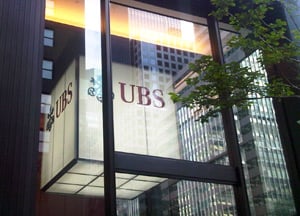Policing Wall Street is hard work.
The U.S. Securities and Exchange Commission, the undisputed top cop on the Street beat, has its work cut out for it. After all, the SEC enforcement squad has to juggle what and whom they go after because they don't have unlimited resources.
We all get that.
What I don't get is why they drop the ball on some of the biggest schemes staring them right in the face.
Take "fair and orderly" markets, for example.
They're not always orderly, and the truth is they aren't fair.
The folks at the SEC know this. So why have they taken so long to do so little about it?
They say they're making progress.
Here's why you can't believe that...
The UBS Dark Pool Fine Is Just a Limp Reprimand
 Last week, with some fanfare because it was the largest fine in such a case, the SEC came down on UBS Group AG (NYSE: UBS) for not following the rules and regulations that make markets fair and orderly - and also for not being honest to its clients.
Last week, with some fanfare because it was the largest fine in such a case, the SEC came down on UBS Group AG (NYSE: UBS) for not following the rules and regulations that make markets fair and orderly - and also for not being honest to its clients.
The record fine was all of $14.4 million (not billion). Maybe that's why you didn't hear about it. It wasn't newsworthy.
The SEC slapped UBS, which runs the second-largest dark pool in the country, on the wrist for violations that occurred from 2008 through 2012. During that time, UBS's dark pool offered select market-makers and high-frequency trading desks illegal order-types. Additionally, UBS broke promises to its own clients, who were told their dark-pool trading data would be strictly confidential.
Because the minimum increment at which stocks can trade is $0.01, it is illegal to submit orders in increments of less than a penny. But that's what UBS allowed its favored clients to do. Not everyone mind you, just select market-makers and HFT traders. That's illegal because bidding or offering at less than a penny moves those orders up in line ahead of pending orders by others who abide by the rules.
What's worse is how UBS broke its clients' anonymity...
It let 103 employees access confidential trading data that dark-pool clients were promised would be strictly confidential. What's most galling about this breach is that exposed trading data could have been used by UBS's own trading desks to trade against its dark-pool clients.
I'm not the kind of guy to say UBS did that. But if I was, I'd sure be saying it now.
Not a lot about dark pools and high-frequency trading is newsworthy as far as the mainstream media is concerned. But it is newsworthy when it comes to trading, to exchanges, to the fabric of the capital markets.
According to a Bloomberg article about the UBS dark pool fine, "The proliferation of exchanges and dark pools has also been defended by some at the agency. Gregg Berman, the Princeton-trained physicist who runs the SEC's analytics office, said last year that the desires of investors and investment managers entails 'an unavoidable increase in the complexity of our markets.'"
Complexity? Really? Coming from the SEC, that's shamefully absurd.
Markets are not complex. It's the quote-stuffing, end-arounds, and front-running that the SEC has allowed that's complex.
What's complex is how and why the SEC ever allowed the trading shops, market-makers, banks, and brokers it sanctifies and coddles to cheat the public and hijack the exchanges and capital markets under its watch.
Remember, these are the entities the SEC is supposed to regulate.
It's not "regulatory capture." It's collusion.
If the SEC regulators weren't in bed with the harlots who screw us all, they wouldn't be juggling all these balls - and failing. They'd be displaying a pair of brass... handcuffs... and locking these crooks up.
A $14.4 million fine? UBS probably makes that every half-hour on its HFT desk.
All Politicians Are Snakes... The House of Representatives passed an act on Jan. 14 providing banks an additional two years to comply with the Volcker Rule. What does this mean? It means Wall Street is about to get paid by D.C.'s new bosses - the old crony capitalists. Here's how they'll be lining their pockets this time...
About the Author
Shah Gilani boasts a financial pedigree unlike any other. He ran his first hedge fund in 1982 from his seat on the floor of the Chicago Board of Options Exchange. When options on the Standard & Poor's 100 began trading on March 11, 1983, Shah worked in "the pit" as a market maker.
The work he did laid the foundation for what would later become the VIX - to this day one of the most widely used indicators worldwide. After leaving Chicago to run the futures and options division of the British banking giant Lloyd's TSB, Shah moved up to Roosevelt & Cross Inc., an old-line New York boutique firm. There he originated and ran a packaged fixed-income trading desk, and established that company's "listed" and OTC trading desks.
Shah founded a second hedge fund in 1999, which he ran until 2003.
Shah's vast network of contacts includes the biggest players on Wall Street and in international finance. These contacts give him the real story - when others only get what the investment banks want them to see.
Today, as editor of Hyperdrive Portfolio, Shah presents his legion of subscribers with massive profit opportunities that result from paradigm shifts in the way we work, play, and live.
Shah is a frequent guest on CNBC, Forbes, and MarketWatch, and you can catch him every week on Fox Business's Varney & Co.



